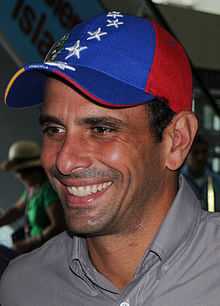Venezuelan parliamentary election, 2015
Venezuelan parliamentary election, 2015

|
|
|
|
All 165 seats of the National Assembly
83 seats needed for a majority |
| |
 |
 |
|
| Leader |
Nicolas Maduro |
Henrique Capriles Radonski |
José Albornoz |
| Party |
PSUV |
MUD |
PPT |
| Alliance |
GPP |
MUD |
GPP |
| Leader since |
2014 |
23 January 2008 |
|
| Leader's seat |
|
none |
|
| Last election |
96 seats, 48.3% |
64 seats, 47.2% |
2 seats, 3.1% |
| Seats needed |
 14 14 |
 19 19 |
 81 81 |
|
Parliamentary elections will be held in Venezuela in 2015.[1] Members of the opposition have speculated that president Nicolas Maduro may suspend the elections, but Maduro has stated the elections will happen even under the most adverse circumstances.[2]
Background
Since the 1999 Constitutional Assembly elections, the National Assembly has been dominated by alliances supportive of then-president Hugo Chávez. In the 2005 parliamentary elections, most opposition parties decided to withdraw, resulting in all seats being won by the Fifth Republic Movement and other parties supportive of Chávez. For the 2010 elections, an alliance of opposition parties was formed by the Democratic Unity Roundtable to contest the elections, and managed to win 64 seats. The PSUV, which was an alliance formed by Chávez from the Fifth Republic Movement and a number of smaller parties won 96 seats, maintaining their majority, but lost their two-thirds and three-fifths supermajority. Fatherland for All, a small left-wing party won two seats.[3] After Chávez's death in 2013, his hand-picked successor Maduro was narrowly elected president, continuing Chávez' ideological influence.[4] The Democratic Unity Roundtable alliance is aiming to improve their result from last time and end the current PSUV government,[1] while Maduro has said he has faith in the voters giving the government a large majority.[2]
Protests
In 2014, a series of protests and demonstrations Venezuela began. The protests have been attributed to inflation, violence and scarcity of food and other goods. The protests have been largely peaceful,[5] but some have escalated and resulted in violence from both protesters and government forces. The government has accused the protests of being motivated by 'fascists' opposition leaders, capitalism and foreign influence,[6] and has itself been accused of censorship, supporting groups using violence against protesters and politically motivated arrests.[7]
Electoral system
The 165 members of the National Assembly are elected by three methods; 110 members are elected by plurality voting in 87 constituencies – 65 single member constituencies, 15 two-member constituencies and four three-member constituencies. A total of 52 seats are elected by closed list proportional representation in 24 multi-member constituencies based on the 23 states and the Capital District; four constituencies elect three members and 20 constituencies elected two members. Seats are allocated using the d'Hondt method. The remaining three seats are reserved for indigenous peoples, and are elected by the community.[8]
References

